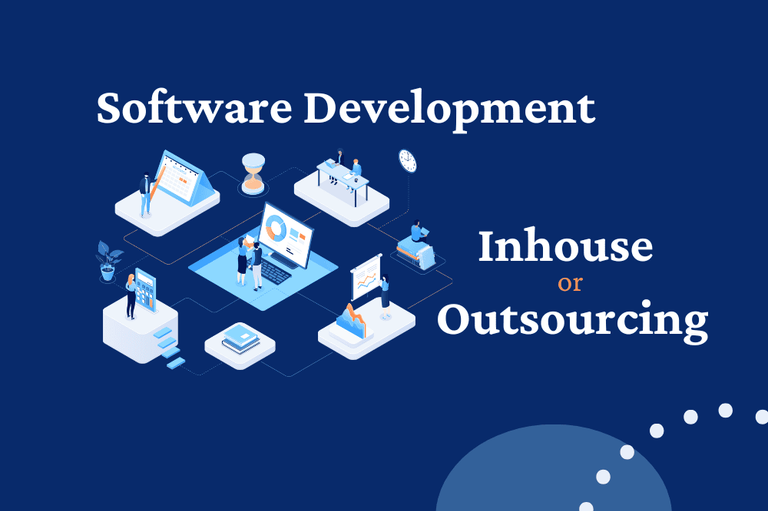
Outsourcing software development is no longer a new or unfamiliar strategy for businesses today. A well-designed outsourcing plan can help companies save on operating costs, recruitment, and training, and it can also help companies allocate their resources more efficiently and optimize their performance.
One of the biggest factors that can affect the success of this strategy is finding a reputable outsourcing partner with the knowledge and experience in the industry in which the business operates. Let's take a look at the steps involved in selecting an IT Outsourcing service provider in the following article.
The project's scope is the first and most important factor to consider when assessing the need for IT outsourcing. This includes the size, complexity, and duration of the project. If the project is small, simple, and can be completed within a short timeframe, it may be more cost-effective to keep it in-house. However, if the project is large, complex, requires new technology, or will take a long time to complete, outsourcing can be a better option.
In addition to the size and complexity of the project, you also need to consider the type of work that needs to be done. If you need specialized skills or expertise that are not available in-house, outsourcing may be the best way to get the job done. For example, if you need to develop a new software application that has AI-processing features such as data analysis and suggestion, you can hire a third party to develop web platforms and apps so that the business has the resources and costs to focus on researching and developing AI models.
The technical expertise required for the project is another important factor to consider. If you have the necessary in-house skills and expertise, you may be able to complete the project without outsourcing. However, if you do not have the necessary skills, you will need to either hire new employees or outsource the work. Outsourcing, compared to hiring new employees, offers swift access to expertise, avoiding administrative burdens and training costs. It grants flexibility, scalability, and predictable expenses while bypassing prolonged onboarding periods, making it a cost-effective and efficient choice for project completion.
In addition to the specific skills required for the project, you also need to consider the level of expertise required in each industry. If the project requires a high level of expertise or strong experience in a specific domain, you may need to outsource the work to a company that has a proven track record of success in similar projects.
The budget and time constraints for the project are also important factors to consider. When facing budget limitations, outsourcing ensures cost-effectiveness by accessing competitive rates, mitigating additional expenses linked to employee hiring and training. In addition, a proficient outsourcing partner fills skill gaps swiftly, saving time on skill acquisition. For urgent project deadlines, it is often better to consider outsourcing to proven companies that guarantee timely completion, leveraging their track record for quality and punctuality.
Let’s start by visiting the websites of potential partners. Look for information on their services, experience, expertise, and methodologies. Pay particular attention to case studies and testimonials that showcase their successful projects and client satisfaction.
Client testimonials are invaluable resources for gauging a partner's performance and understanding their work ethic. Look for testimonials on the company's website, social media pages, and independent review platforms like G2 review, Clutch or GoodFirms. Don’t forget to also check online reviews on platforms like Google Reviews, Trustpilot, and Yelp. Explore both positive and negative reviews to gain a comprehensive understanding of the partner's strengths and weaknesses, as well as their approach to client service and project management.
Moreover, following potential partners on social media may help you gain insights into their company culture, thought leadership, and engagement with their community. This can give you a sense of their values, communication style, and overall approach to business.
While evaluating potential IT outsourcing partners, assessing their technical proficiency is very important. This is one of the key points in any IT outsourcing project. This goes beyond simply reading through a list of skills and certifications. Here are some key aspects to focus on.
Review the partner's portfolio of past projects. Look for projects similar to your own in terms of scope, complexity, and technology stack. This will provide valuable insights into their ability to handle your specific needs and if they can complete the project.
Some questions you may ask while searching about a potential partner: Do they have experience with the latest technologies relevant to your project? Are their developers proficient in programming languages and frameworks necessary for your specific needs? Do they have experience in solving similar problems?
Ensure the Outsourcing team continuously learns and stays updated with the latest technologies and trends. You can get some images, videos of their participation in conferences, workshops, and training programs. This demonstrates their commitment to staying ahead of the curve, delivering cutting-edge and qualified solutions
When choosing an IT outsourcing partner, cultural compatibility often gets overlooked. However, it plays a vital role in ensuring a smooth and successful collaboration.
Different cultures have distinct communication styles, failure to understand them often leads to misunderstandings and inefficiencies in project execution. Consider this element to ensure alignment with your communication style to avoid delays and misinterpretations.
Shared values like integrity, transparency, and dedication to quality lay the groundwork for a strong and trustworthy partnership.
Time zone differences can be a major hurdle to overcome. If you look for a team who works with you in the same time zone, it’s better to have an onshore or near shore team instead of offshore.
Refer you to read: Onshore, off shore, nearshore in IT outsourcing.

Effective collaboration requires mutual understanding and respect for different perspectives. Assess the partner's ability to work collaboratively, share information openly, and resolve conflicts constructively. This ensures efficient project management and a positive working environment.
Security compliance is crucial for IT outsourcing providers. Ensuring adherence to Non-Disclosure Agreements (NDAs) and comprehensive security agreements is vital. Before selecting an outsourcing partner, confirm their commitment to these safeguards. NDAs and security agreements signify a dedication to client confidentiality and data protection. Prioritizing providers who strictly follow such protocols is essential for establishing a secure and trustworthy partnership in the realm of IT outsourcing.
Don't forget to clearly define your project scope, expectations, and potential changes in requirements and discuss with the potential partner about the capacity to scale resources, adapt to evolving project needs, and handle increased workloads. Inquire about their track record in managing dynamic projects and instances where they've accommodated scalability.
A reliable outsourcing partner will have a flexible engagement model, be adaptable to changes, and possess the infrastructure to seamlessly scale operations. This ensures your IT outsourcing arrangement is not only efficient in the present but also well-equipped to evolve with your business demands.
Review their methodologies and tools to assess the IT outsourcing partner's project management. You can ask about project tracking, milestone reporting. A reliable partner will have transparent reporting, use collaborative tools, and prioritize effective communication. This ensures that the outsourcing relationship is built on strong project management foundations, fostering efficient workflows and clear lines of communication throughout the engagement.
Clearly define the pricing model that aligns with your project needs, whether it's a fixed price or a Time and Materials (T&M) approach. Be aware of potential hidden costs, such as additional fees for scope changes, maintenance, or support. Engage in transparent discussions about the pricing structure, ensuring that all aspects of the project are covered.
For the proposal, feel free to request the IT service provider a detailed breakdown of costs and inquire about any potential contingencies. Additionally, carefully assess the partner's track record for cost management in previous projects. Reliable outsourcing partners provide comprehensive estimates and transparent pricing structures. This proactive approach ensures that your IT outsourcing collaboration is not only cost-effective but also avoids unpleasant financial surprises down the line.
And the last thing is weighing the pros and cons of each provider with all the information you gather, judging and feeling about them. Develop a set of criteria, assigning weights to each based on their importance to your project. This structured evaluation ensures a comprehensive understanding of the potential partner's strengths and weaknesses.
Subsequently, enter negotiations with clarity. Clearly articulate your expectations, discussing terms, timelines, and deliverables openly. Don't shy away from expressing your needs and concerns. This opens to establishing a solid foundation for a collaborative partnership, aligning expectations, and paving the way for a successful and mutually beneficial outsourcing venture.
Remember, proactive communication and negotiation contribute significantly to the long-term success of the partnership.
The processes and aspects outlined above should be followed and examined when selecting a partner to assist you with your outsourcing plan. However, it is also dependent on your requirements and plan to have more than the items listed.
BlueOC is a name to consider if you are searching for a reliable partner who not only has a solid track record in software development and an open-minded attitude for change and innovation but also adheres to excellent quality and management. We have extensive expertise in a variety of industries (retail, automotive, energy, insurance, healthcare, transportation, and so on) as well as extensive research in next-generation technologies such as AI, IoT, AR/VR, and Big Data. Contact us right now for rapid and expert advice.


